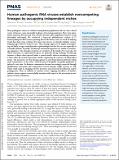Human pathogenic RNA viruses establish noncompeting lineages by occupying independent niches
Author(s)
Mutz, Pascal; Rochman, Nash D; Wolf, Yuri I; Faure, Guilhem; Zhang, Feng; Koonin, Eugene V; ... Show more Show less
DownloadPublished version (1.685Mb)
Publisher with Creative Commons License
Publisher with Creative Commons License
Creative Commons Attribution
Terms of use
Metadata
Show full item recordAbstract
<jats:title>Significance</jats:title>
<jats:p>Numerous pathogenic viruses are endemic in humans and cause a broad variety of diseases, but what is their potential for causing new pandemics? We show that most human pathogenic RNA viruses form multiple, cocirculating lineages with low turnover rates. These lineages appear to be largely noncompeting and occupy distinct epidemiological niches that are not regionally or seasonally defined, and their persistence appears to stem from limited outbreaks in small communities so that only a small fraction of the global susceptible population is infected at any time. However, due to globalization, interaction and competition between lineages might increase, potentially leading to increased diversification and pathogenicity. Thus, endemic viruses appear to merit global attention with respect to the prevention of future pandemics.</jats:p>
Date issued
2022-06-07Department
Massachusetts Institute of Technology. Department of Brain and Cognitive SciencesJournal
Proceedings of the National Academy of Sciences
Publisher
Proceedings of the National Academy of Sciences
Citation
Mutz, Pascal, Rochman, Nash D, Wolf, Yuri I, Faure, Guilhem, Zhang, Feng et al. 2022. "Human pathogenic RNA viruses establish noncompeting lineages by occupying independent niches." Proceedings of the National Academy of Sciences, 119 (23).
Version: Final published version